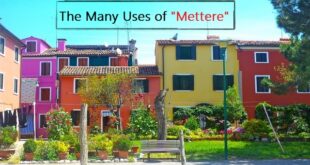Imperfetto or Passato Prossimo? Previous blogs in this series have discussed the basics of how to conjugate and use the imperfetto and the passato prossimo to speak about the recent past.* As we’ve mentioned before, the conjugation of these verb forms is fairly straightforward; the tricky part is knowing which past tense to choose to describe a particular event. To make matters more complex, a compound sentence can be created using only the imperfetto, only the passato prossimo, or a combination of both. And in many situations, the same event can be described in Italian using either the imperfetto …
Read More »Search Results for: Imperfetto or Passato Prossimo
The Italian imperfetto
If we want to make general statements in Italian about what has happened in the past, we must be willing to be a little imperfetto! The conjugation of the imperfetto past tense is fairly straightforward. The tricky part is knowing how to use this verb form. The Italian imperfetto refers to the recent past, and is useful when describing events that happened frequently in the past without a specific time frame. The imperfetto in Italian translates into the simple past tense in English and also into “used to” or “was/were…ing.” Let’s learn how to form this tense, which is actually …
Read More »The many uses of mancare
The Italian verb mancare has many meanings: to miss (someone)/to need (something)/to lose/to lack/to be lacking/to omit/to fail and can even be used as a euphemism for to die. Perhaps the most common way Italians use the verb mancare is to convey the idea of “to miss someone,” which was discussed in detail in a previous blog in this series, ” ‘Missing You’ with Mancare” In the prior blog, the conjugation of mancare and the use of indefinite object pronouns needed to convey the idea of “missing someone” was discussed in detail. With this blog, we will now focus on the …
Read More »The Many Meanings of “Entrare” and “Entrarci”
The Italian verb entrare is often used to describe physically entering a place and can be translated as “to enter,” “to go in” or “to come in.” In fact, the Italian and English verbs entrare and enter are cognates; both verbs share a common origin in the Latin language. Also, along with carrying the same primary definition, entrare and enter have a similar sound when pronounced in each language, and are used in a similar way. Besides the basic meaning of “to enter a place,” entrare and enter are also the verbs used to give direction to performers. For instance, the …
Read More »How to use the verb “dovere”
The Italian verb dovere fills an essential role in everyday life, whether one is a traveler to Italy or is speaking to an acquaintance, friend, or family. Dovere is used as a helping verb to emphasize the obligation or the need to complete an action with its meanings of “to have to,” or “to must.” Think of how many times a day we say we “have to” or “must” do something — leave for work or school, run an errand, meet a friend we haven’t seen in a while — the permutations are endless! Also, it is important to note …
Read More »“Dare” and verbs of giving
The Italian verb dare is most often used with the meaning “to give,” or literally, “to hand over” something to someone else. When the object “handed over” is a gift, dare may be used to describe this action or the more specific verbs of gift-giving may come into play, such as regalare (to give a gift) and donare (to donate). To truly sound like a native Italian, learn the quintessential Italian interjection, “Dai!” from the second person conjugation of dare. The Italian verb dare is also an integral part of an important Italian expression, “dare del tu,” which allows one to …
Read More »Italian linking verbs
Italian Linking Verb Essere “To be, or not to be…” is one of the most famous lines ever written in the English language. But that phrase would not be possible without a verb to express the very idea that we exist. Think of how many times a day we say, “I am” or “he is” or “we are” — all forms of the English infinitive verb “to be.” In Italian, the verb essere means to be. Essere in the present tense is a linking verb, as it connects the subject in the beginning of the sentence with specific information …
Read More »Tag teaming two past tenses
Combining the Imperfetto with the Passato Prossimo Choosing an Italian Past Tense Let’s start our blog about how to combine the imperfetto with the passato prossimo by reviewing some general rules of Italian grammar. We learned in “Picking an Italian Past Tense” that the circumstances surrounding the event will determine which Italian past tense to use. Luckily, imbedded in many Italian sentences about past events are certain words and phrases that will indicate whether the imperfetto or the passato prossimo is needed. The intent of the speaker will be signaled by these phrases, which will then trigger use of the correct …
Read More »The many uses of mettere
The Italian verb mettere and its reflexive counterpart mettersi are used in many colloquial expressions in Italy today. It is important to “put in” the time to learn how to use mettere, both literally and figuratively, if one wants to speak Italian like a native! The Italian verb mettere is most often translated into English as “to put” or “to place.” It can be used in a simple way, to describe moving an object from one place to another. Mettere is commonly used with the prepositions a, da, in and su in many Italian expressions that have the connotation of “putting” …
Read More »The Many Uses of “Tenere”
The Italian verb tenere has a wide range of meanings and its use lends a bit of sophistication to one’s Italian. It is important to “keep in mind” the nuances of the verb tenere to create sentences as we would in our native language. The Italian verb tenere is most often translated into English as “to hold” or “to keep.” It can be used in a simple way, to describe holding an object or holding another’s hand. As in English, the verb tenere can also mean “to hold,” with reference to capacity, as in how many objects or people can occupy …
Read More » Fra Noi Embrace Your Inner Italian
Fra Noi Embrace Your Inner Italian











